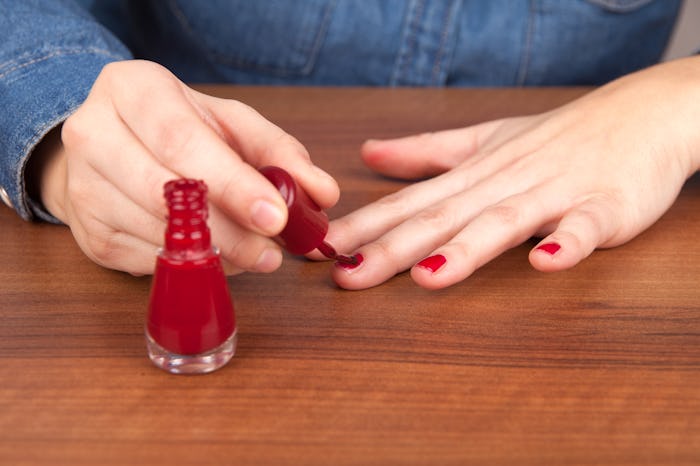Health

New Study Suggests Chemical In Nail Polish May Contribute To Postpartum Depression
Exposure to chemicals used in plastics and some beauty products was found to be associated with higher risks of postpartum depression.
A new study published in the Endocrine Society's Journal of Clinical Endocrinology & Metabolism suggests there may be a link between postpartum depression and exposure to chemicals found in plastics and beauty products such as nail polish, shampoo, and perfume. Researchers found endocrine-disrupting chemicals called phthalates may influence hormonal shifts and contribute to postpartum depression.
“Phthalates are a class of chemicals used in plastics and personal care products that have been shown to affect and interfere with endogenous hormones,” Melanie Jacobson, the study’s lead author and an epidemiologist and research scientist at the NYU Langone Medical Center in New York, tells Romper. “Their use is so widespread that nearly all U.S. adults, including pregnant women, have detectable levels in their systems.”
According to the U.S. Food and Drug Administration (FDA), phthalates can prolong a fragrance's shelf life and increase the flexibility of plastic. They’re found in a wide array of products, including toys, vinyl flooring, detergents, food packagings, and personal care products like nail polish, hair sprays, aftershave lotions, soaps, shampoos, and perfumes. In nail polish, for example, phthalates known as dibutylphthalate serve as a plasticizer, essentially working to reduce cracking within the polish. In hair spray, phthalates known as dimethylphthalate help create the flexible hold users love. In perfumes, phthalates known as diethylphthalate helps preserve the fragrance.
In studying urine and blood samples from 139 pregnant women who were also assessed using the Edinburgh Postnatal Depression Scale (EPDS) four months after giving birth, researchers found women with higher levels of phthalates in their urine were more likely to have developed postpartum depression and have lower levels of progesterone, a hormone that helps regulates the menstrual cycle and boost one’s mood.
But although phthalates are widely used, Jacobson says it may still be possible for pregnant people to reduce their exposure to the chemicals through careful monitoring. “Because phthalate exposure is potentially modifiable — meaning that it can be reduced through dietary and behavioral interventions such as avoiding food packaging, certain cosmetics, and polycarbonate plastic products — our findings suggest that exposure to phthalates could be a potentially modifiable risk factor for postpartum depression,” Jacobson says.
“In other words, if our findings are replicated and validated by future studies, the results could inform prevention strategies focused on reducing exposure to phthalates in pregnancy,” she tells Romper.
According to a 2020 survey from the Centers for Disease Control and Prevention (CDC), approximately one in eight women reported postpartum depressive symptoms following the birth of a child. These symptoms can include a depressed mood, severe mood swings, withdrawal from friends and family, difficulty bonding with baby, feelings of overwhelm or worthlessness, and anxiety. But postpartum depression doesn’t just make people feel bad, it can have a serious affect on both mom and baby’s health.
“Postpartum depression is associated with lower rates of breastfeeding initiation, poorer maternal and infant bonding, and increased likelihood of infants showing developmental delays,” the CDC noted in its 2020 survey. “Left untreated, postpartum depression can adversely affect the mother’s health and might cause sleeping, eating, and behavioral problems for the infant; when effectively treated and managed, both mother and child benefit.”
Still, Jacobson’s isn’t advising pregnant people to toss out all their personal care products just yet. In fact, she tells Romper her study was small and more research on the topic is needed. "These results need to be interpreted with caution as this is the first study to examine these chemicals in relation to postpartum depression and our sample size was small," she says.
If you or someone you know is experiencing depression or anxiety during pregnancy, or in the postpartum period, contact the Postpartum Health Alliance warmline at (888) 724-7240, or Postpartum Support International at (800) 944-4773. If you are thinking of harming yourself or your baby, get help right away by calling the National Suicide Prevention Lifeline at 1-800-273-8255, or dialing 911. For more resources, you can visit Postpartum Support International.